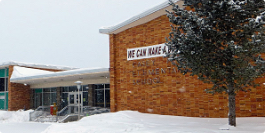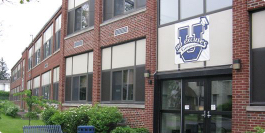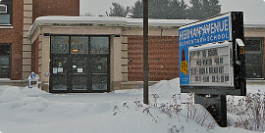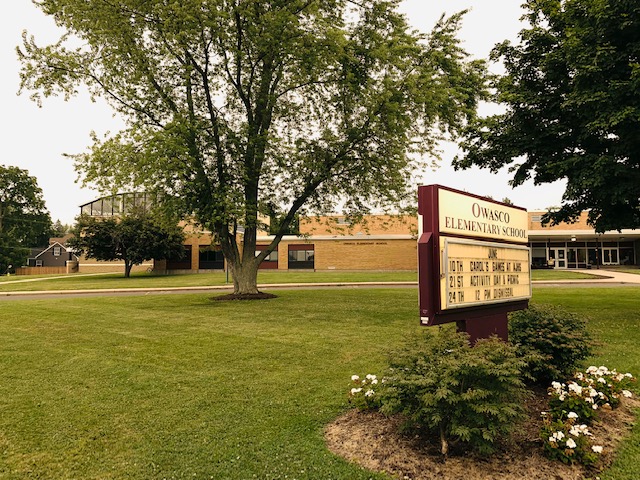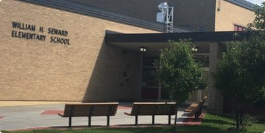Instructional coaches play key role in helping Auburn teachers
Christopher SciriaAECSD Public Information Specialist
Like any profession, teachers need regular learning opportunities to help them continually grow in their knowledge and application of teaching practices and strategies with the overall goal to boost their students’ performance.
The Auburn Enlarged City School District has instructional coaches that work with its teachers, following a plan to achieve these goals. According to the district, coaches aim “to increase the quality and effectiveness of instruction through an observation and feedback cycle based on targeted feedback and practice.”
Coaches come from the teaching ranks and are considered teacher leaders. They have attended training and professional learning sessions to build their knowledge base and regularly work with teachers in individual, small group and larger group settings. According to the district, they do not evaluate teachers or provide information that would be used for evaluation or take primary responsibility for instructing students. Overall, the coaches support the development and knowledge building of the teaching staff, which is very different from students.
“Most districts in our region and beyond have their coaches go through training,” said Jodi Burnash, a curriculum coordinator with Cayuga-Onondaga BOCES who assists the Auburn district. “There are some folks out there in the educational research world that are considered experts, they've done tons of research on instructional coaching and so they try to bring in some of that work into training the coaches and giving them the professional development, they need to be leaders for adults.”
For Meghan Parry, a literacy coach at Casey Park Elementary, it was a big change from teaching first, second and fifth grades.
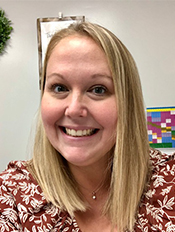
“That's where it was a big transition for me,” said Parry, who became a coach in 2019. “I grew up wanting to be a teacher. My aunt was a teacher. She was my role model, when I was younger, I always had that fake classroom and my mom was my student. So I always loved working with kids and that's where the transition is. You work often more with adults here to better their practice and support them.”
Coaches meet with teachers to set goals, observe classrooms and then follow up to see how they are doing. There is support for instruction, curriculum/content, data analysis and to facilitate professional learning.
“Most of what they do is try to change the outcome of student achievement and student engagement through empowering teachers and building their capacity,” Burnash said. “They sometimes work with principals or building leaders, they do a lot of data analysis.”
She added that they are a key partner in screening students to find out what their levels are to determine which students need intervention and then help teachers to support that.
Data is used to analyze instructional decisions and to make suggestions for improvements.
“There's a lot of data analysis and determining instructional needs,” Parry said. “Another part that is huge is the curriculum piece of it. Making sure teachers have their materials, they're comfortable with the teaching of the curriculum. I also run monthly data meetings where we cycle back to see where students are at, if students need to move up levels, or they move down.”
Sometimes coaches work to find ways to help teachers if they need more training.
“We have professional development services here that we offer,” Burnash said. “There are instructional technology services. There are lots of different things that we offer to the schools in our region. My role is to work in the professional development unit. So although I'm a curriculum coordinator, what I do is I support looking at curriculum instruction and assessment and data analysis. I work with principals and teachers and district level coordinators to say, let's take a look at your curriculum as it works for your kids. What’s your data look like, how many interventions do you need? Do your teachers need training? If so, send them to me, I will train them.”
Coaching cycles are set throughout the academic year when coaches meet with teachers to strengthen relationships and discuss how things are going. The idea is to give teachers ways to better instruct their students.
“It's really just me going in supporting the teacher and saying let's try this with a student. Let's go back to the drawing board,” Parry said. “I often use (an analogy of) kind of going to the doctor, if something’s not working we want some sort of medication to fix it. That's where I kind of come and say, well, let's try this intervention and then what we oversee a lot of too, is called progress monitoring. So that's like if you're going to a doctor to see if your medication is working, we are progress monitoring these students to see if it's working. After six to eight weeks and the student is making gains, great, if they're not making gains, that's when we come back to the drawing board and support the teacher.”
Parry says her role includes supporting teachers when they need it.
“A lot of times teachers just need someone to listen and that's what I do in my office,” she said. “I feel like sometimes it's just kind of a listening center. So we set a goal and see if we're achieving the goal with them.”
Burnash says a good academic coach needs a certain skill set to be successful.
“Patience, flexibility, social intelligence, all of those things,” she said. “Because working with adults brings a different set of challenges than working with kids, right? It's sometimes harder to get adults to trust you. So you have to have all the right social skills in place and you have to be willing to do the work to build the relationships to get the trust so that the adults invite you in so that you can help the teachers grow professionally.”
To be able to do that, Burnash says a successful academic coach needs to have a growth mindset and strategies that value professional development and professional learning.
“You are trying to empower other teachers to do the same thing, so it has to be part of your value system,” she said, “I think that you have to have an openness to really looking at numbers and really understanding what those numbers mean and what the impact is for kids. And you have to have done it long enough to have a toolbox of instructional strategies at the ready that you can pull out.”
In the end, coaches play an important role in education in helping teachers improve educating students that most outside of the profession know little about.
“I think that it's important that the community realizes that we don't underestimate the value of instructional coaches,” Burnash said. “Because, If you're not in the field, you don't realize the demands that are put on teachers and on building leaders and having instructional coaches, who can pull back, look at the bigger picture, look at the numbers, strategize and make meaningful strategic plans. Having someone whose job it is to actually pull back from the day-to-day craziness and say, hold on, let's set some goals. How are we going to approach it? What are the benchmarks? What are the milestones? It really helps schools grow. And it's an underappreciated job because people don't see the effect of your work until the end.”



